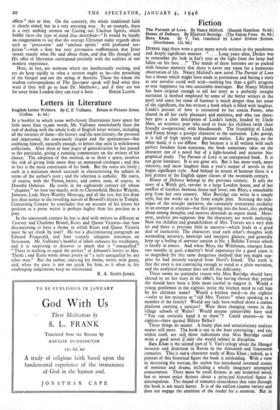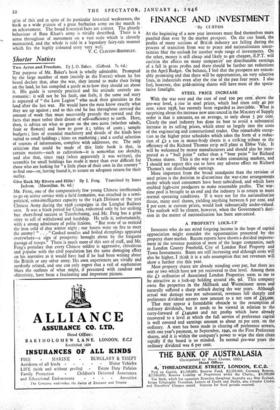' Fiction
Batu Khan. By V. Yan, translated by Lionel Erskine .Britton. (Hutchinson. 12s. 6d.)
DURING 1945 there were a great many novels written in the ponderous and deeply significant manner. " . . Long years after, Deidre was to remember the look in Ian's eyes as the light from the lamp had fallen on his face. . ." The minds of these heroines are so packed with fatuous memory that there is never any room for a humorous observation of life. Nancy Mitford's new novel The Pursuit of Love has a theme which might have made as portentous and boring a story ' as any novelist could well wish—nothing less than a girl's progress to true happiness via two unsuitable marriages. But Nancy Mitford has been original enough to tell her story as a perfectly straight narration (a method employed by some of the better writers in the past) and since her sense of humour is much deeper than her sense of the significant, she has written a book which is filled with laughter. Linda's pursuit of love is recounted by her cousin Fanny, who shared in all her early pleasures and anxieties, and who can there- fore give a clear description of Linda's family, headed by Uncle Matt, an eccentric peer • who used to hunt his children (with their friendly co-operation) with bloodhounds. The friendship of Linda and Fanny brings a gossipy character to the narration. Like gossip, it is full of high spirits and pleasant malice. Like gossip, on the other hand, it is too diffuse. But because it is all written with such perfect freedom from nonsense, the book sometimes takes on the character not of a novel but of a light-hearted and accurate bio- graphical study. The Pursuit of Love is an unexpected book. It is not great literature. It is not great wit. But it has more truth, more sincerity, and more laughter than a year's output of novels in the bogus significant style. And behind its screen of humour there is a just picture of the English upper classes of the twentieth century.
House of Defence belongs to the previous century. It tells the story of a Welsh girl, servant in a large London house, and of her conflict of loyalties between house and lover, one Rhys, a remarkable prig from her own country. Miss Berridge can write in a simple style, but she works on a far from simple plan. Scorning the tech- nique of the straight narrative, she constantly overstrains credulity in an attempt at analysis—but this peering into the heart, this probing about among thoughts and motives demands an expert mind. More- over„ analysis pre-supposes that the characters are worth analysing. Now the children and grandchildren of Mrs. Travers are a very dim lot and there is precious little to uncover—which leads to a good deal of insincerity. The characters read each other's thoughts with astounding accuracy, intercept and interpret glances, and generally keep up a feeling of .nervous tension at No. 3 Bolitho Terrace which is hardly in nature. And when Rhys, the Welshman, emerges from two months in gaol, amartyr's brief experience for a good cause is so magnified (by this same dangerous method) that you might sup- pose he had recently escaped from Devil's Island. The truth is that the story is not convincing enough to stand as a plain narration, and the analytical manner does not fill the deficiency.
There seems no particular reason why Miss Berridge should have elected to set her story in the 188o's, but having chosen that period she should have been a little more careful to suggest it. Would a young gentleman in the eighties invite the kitchen maid to call him_ by his christian name? Would a kitchen maid—in the eighties —refer to her mistress as "old Mrs. Travers" when speaking to a member of the family? Would any lady have walked down a station platform carrying a suitcase? Were there changing rooms in the village schools of Wales? Would anyone conceivably have said " You can certainly hand it to them "? Could ahyone—in the eighties—have quoted Hilaire Belloc?
These things do matter. A faulty plan and unsatisfactory analysis matter still more. The book is not in the least convincing: and yet, within itself, are still those indications that Miss Berridge could write a good novel if only she would submit to discipline.
Batu Khan is the second part of V. Yan's trilogy about the Mongol invasion and dominion in Russia m the thirteenth and fourteenth centuries. This is not' character study of Batu Khan ; indeed, as a portrait of this historical figure the book is misleading. With a View to increasing the tension, the author has introduced invented scenes of romance and drama, including a wholly imaginary attempted assassination. There must be small fictions in any historical novel, but to invent major fictions about a principal historical figure is unscrupulous. The thread of romantic coincidence that runs through the book is not much better. It is of the earliest cinema variety and does not engage the attention of the reader for a moment. But in spite of this' and in spite of its particular historical weaknesses, the book as a wide p:cture of a great barbarian army on the march is an achievement. The broad historical facts are correct. The ghastly behaviour of Batu Khan's army is vividly described. There is a sense throughout of .movement on a vast scale which is cleverly maintained, and the whole is told in a legendary fairy-tale manner which fits the highly coloured story very well.
V. C. CLINTON-BADDELEY.
































 Previous page
Previous page